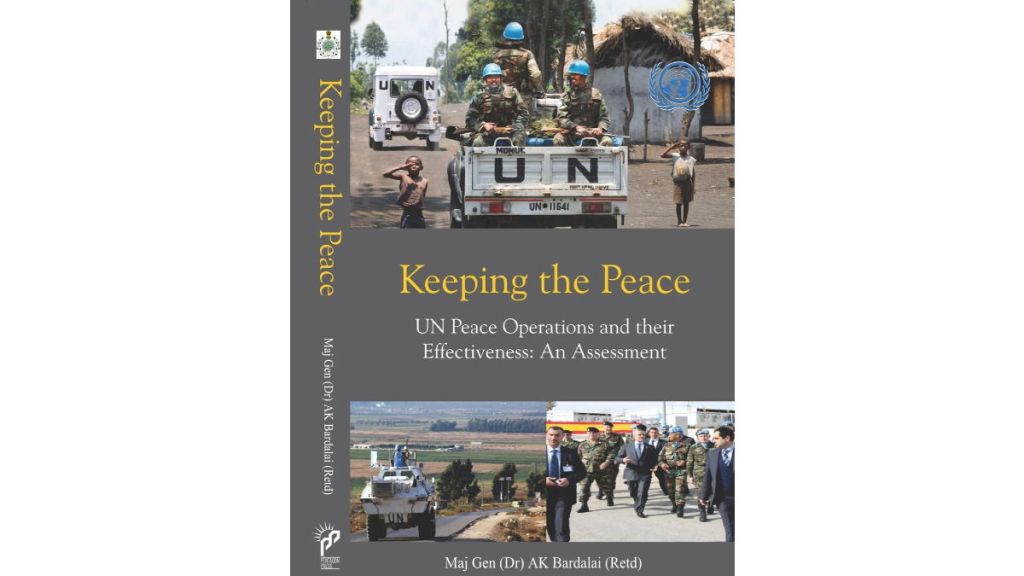Concerns over regional conflicts due to the complex involvement of local, regional and national elements, India’s perspectives on UN Peacekeeping operations, regional conflicts, terrorism, organised crime and more were discussed at an event organised by United Service Institution (USI), New Delhi.
Acknowledging ‘leaving behind’ an improved political and security situation as the ultimate goal of peacekeeping, the committee recognised the successes of the UN in peacekeeping and conflict resolutions including Timor-Leste, Sierra Leone, Namibia, Cambodia, Mozambique, Angola, etc.
About the USI event
It was hosted by the Challenges Forum International Secretariat and the United Service Institution of India (USI), with almost 100 key stakeholders from more than 40 countries gathered in New Delhi.
At the two day event from Oct 6-7, 2022, the stakeholders discussed future multilateral peace operations, how they can remain relevant and to play a positive role in dealing with emerging security and peace challenges.
The theme of CAF22 was based on the theme “Future of Peace Operations” and there were three sub-themes: Place for Preventive Deployment in Diplomacy; Protecting the Protectors; and Protection of Civilians in Peace Operations.
The deliberations according to USI were facilitated and coordinated by Ms Pernilla, Director Challenges Form and Maj Gen PK Goswami, VSM, a former military observer and Deputy Director USI.
India is the highest troop contributing country (TCC)
Highlighting India’s role and contribution to Peacekeeping Missions, Sanjay Verma, Secretary (West), Ministry of External Affairs (MEA) gave guidelines on India’s perspective on the UN and UN Peacekeeping. He also talked about democratising the UN Security Council (UNSC) by bringing in realities of 21st century membership and including TCC in mandate formulation and planning.
Maj Gen BK Sharma, Director USI brought out the emerging challenges in the arctic region, technology, cyber-space, and proliferating social media, which requires special attention from global discussion forums.
Also Read: UN peacekeeping chief Jean-Pierre Lacroix to visit India
Future Peace Operations and Regional Peace and Security Arrangements
Elizabeth Spehar, Assistant Secretary-General for Peacebuilding deemed it important that intermediate goals like Civilian protection and national capability building be met. And to achieve this, regional and sub-regional partners are necessary and further diversification of operations and their multidimensional facets are important.
Expressing concerns over regional conflicts like Mali and the Democratic Republic of Congo due to the complex involvement of local, regional and national elements, Under-Secretary-General for Peace Operations, Jean-Pierre Lacroix, talked about limits of peacekeeping operations.
Peacebuilding funds provide resources and assist with the mobility of various tools for the same. However, the involvement of International financial institutions like the World Bank and Private sectors to strategically align with them is just as necessary. Concern was expressed for a shared understanding of the root causes of tensions and subsequent conflicts and the consequential need for joint analysis.
The need for youth representation and participation in peace courses, the inclusion of other stakeholders and the need for peer-to-peer engagement were expressed by African Union’s Youth Ambassador for Peace in South Africa, Cynthia Chigwenya. She also expressed that economic incentives and unemployment are the factors that push the young into insurgency or a conflict in its infancy. So, it is important to deal with the symptoms and to resolve the conflict.
Takeaways and Future Perspectives
A central question for peacekeeping operations and their TCCs is how to keep peacekeepers safe and secure while carrying out their mandates. How can a far better understanding of attack patterns on peacekeepers aid in the development of operational responses? How can this information be used to improve local perceptions of peacekeepers while also increasing their safety and security? The top priority of peacekeeping is safety and security.
Dr Yvan Ilunga, Assistant Professor of Political Science and International Relations, at Salve Regina Universityraised a very critical question about the idea of image, who exactly is a Peacekeeper? Are they Peacekeepers or are they institutions?
Also Read: Critical to reassess UNSC’s approach towards peacekeeping, address security, operational challenges faced by peace operations: India
Book Release
On the sidelines of another seminar related to `Future of peacekeeping’ which was organised in partnership with Challenges Forum, Sweden on Oct 6-7 a book on ‘Keeping the Peace – UN Peace Operations and their Effectiveness: An Assessment’ was released by Per Olsson Fridh, Chair, Challenges Forum Partner Meeting, Director of the Folke Bernadotte Academy and former Minister for International Development Cooperation in Sweden.
The book which is about assessing the effectiveness of traditional UN Peace Operations has been authored by Maj Gen (Dr) AK Baradalai (Retd), Distinguished Fellow USI and former Deputy Forces Commander at UNIFIL.
According to USI, the book goes on to develop a conceptual framework for the evolution of UN peace operations and to also apply that to assess the performance of a regular UN Peace Operation with UNIFIL as a case study.

